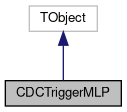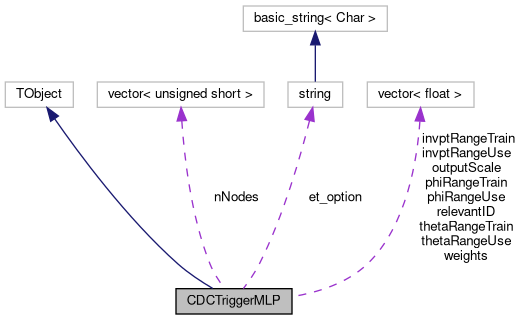 |
Belle II Software
release-08-01-10
|
 |
Belle II Software
release-08-01-10
|
Class to keep all parameters of an expert MLP for the neuro trigger. More...
#include <CDCTriggerMLP.h>


Public Member Functions | |
| CDCTriggerMLP () | |
| default constructor. | |
| CDCTriggerMLP (std::vector< unsigned short > &nodes, unsigned short targets, std::vector< float > &outputscale, std::vector< float > &phirangeUse, std::vector< float > &invptrangeUse, std::vector< float > &thetarangeUse, std::vector< float > &phirangeTrain, std::vector< float > &invptrangeTrain, std::vector< float > &thetarangeTrain, unsigned short maxHits, unsigned long pattern, unsigned long patternMask, unsigned short tmax, const std::string &etoption) | |
| constructor to set all parameters (not weights and relevantID ranges). | |
| ~CDCTriggerMLP () | |
| destructor, empty because we don't allocate memory anywhere. | |
| bool | isTrained () const |
| check if weights are default values or set by some trainer | |
| unsigned | nLayers () const |
| get number of layers | |
| unsigned | nNodesLayer (unsigned iLayer) const |
| get number of nodes in a layer | |
| unsigned | nWeights () const |
| get number of weights from length of weights vector | |
| unsigned | nWeightsCal () const |
| calculate number of weights from number of nodes | |
| std::vector< float > | getWeights () const |
| get weights vector | |
| void | setWeights (std::vector< float > xweights) |
| set weights vector | |
| unsigned short | getMaxHitsPerSL () const |
| get maximum hit number for a single super layer | |
| unsigned long | getSLpattern () const |
| get super layer pattern | |
| unsigned long | getSLpatternMask () const |
| get bitmask for super layer pattern | |
| unsigned long | getSLpatternUnmasked () const |
| get raw super layer pattern | |
| unsigned short | getTMax () const |
| get maximal drift time | |
| std::vector< float > | getIDRange (unsigned iSL) const |
| get relevant ID range for given super layer | |
| void | setRelID (std::vector< float > relid) |
| set and get total relevant ID range | |
| std::vector< float > | getRelID () const |
| std::string | get_et_option () const |
| Returns way of obtaining the event time. | |
| bool | inPhiRangeUse (float phi) const |
| check whether given phi value is in sector | |
| bool | inPtRangeUse (float pt) const |
| check whether given pt value is in sector | |
| bool | inInvptRangeUse (float invpt) const |
| check whether given 1/pt value is in sector | |
| bool | inThetaRangeUse (float theta) const |
| check whether given theta value is in sector | |
| bool | inPhiRangeTrain (float phi) const |
| check whether given phi value is in training sector | |
| bool | inPtRangeTrain (float pt) const |
| check whether given pt value is in training sector | |
| bool | inInvptRangeTrain (float invpt) const |
| check whether given 1/pt value is in training sector | |
| bool | inThetaRangeTrain (float theta) const |
| check whether given theta value is in training sector | |
| bool | isRelevant (float relId, unsigned iSL) const |
| check whether given relative TS ID is in relevant range | |
| float | scaleId (double relId, unsigned iSL) const |
| scale relative TS ID from relevant range to approximately [-1, 1] (to facilitate the FPGA implementation, the scale factor is rounded to a power of 2) | |
| std::vector< float > | scaleTarget (std::vector< float > target) const |
| scale target value from outputScale to [-1, 1] | |
| std::vector< float > | unscaleTarget (std::vector< float > target) const |
| scale target value from [-1, 1] to outputScale | |
| int | zIndex () const |
| get target index for z (-1 if no output is trained for z) | |
| int | thetaIndex () const |
| get target index for theta (-1 if no output is trained for theta) | |
Private Member Functions | |
| ClassDef (CDCTriggerMLP, 11) | |
| Needed to make the ROOT object storable. | |
Private Attributes | |
| std::vector< unsigned short > | nNodes |
| Number of nodes in each layer, not including bias nodes. | |
| std::vector< float > | weights |
| Weights of the network. | |
| bool | trained |
| Indicator whether the weights are just default values or have been set by some trainer (set to true when setWeights() is first called). | |
| unsigned short | targetVars |
| output variables: 1: z, 2: theta, 3: (z, theta) | |
| std::vector< float > | outputScale |
| Output[i] of the MLP is scaled from [-1, 1] to [outputScale[2i], outputScale[2i+1]]. | |
| std::vector< float > | phiRangeUse |
| Phi region in radian for which this expert is used. More... | |
| std::vector< float > | invptRangeUse |
| Charge / Pt region in 1/GeV for which this expert is used. More... | |
| std::vector< float > | thetaRangeUse |
| Theta region in radian for which this expert is trained. | |
| std::vector< float > | phiRangeTrain |
| Phi region in radian for which this expert is used. More... | |
| std::vector< float > | invptRangeTrain |
| Charge / Pt region in 1/GeV for which this expert is trained. More... | |
| std::vector< float > | thetaRangeTrain |
| Theta region in radian for which this expert is trained. | |
| unsigned short | maxHitsPerSL |
| Maximum number of inputs for a single super layer. | |
| unsigned long | SLpattern |
| Super layer pattern for which this expert is trained. More... | |
| unsigned long | SLpatternMask |
| Bitmask for comparing the super layer pattern. More... | |
| unsigned short | tMax |
| Maximal drift time (for scaling), hits with larger values are ignored. | |
| std::vector< float > | relevantID |
| Hits must be within ID region around 2D track to be used as input. More... | |
| std::string | et_option |
| Returns way of obtaining the event time. More... | |
Friends | |
| class | CDCTriggerNeuroTrainerModule |
| class | NeuroTrigger |
Class to keep all parameters of an expert MLP for the neuro trigger.
Definition at line 20 of file CDCTriggerMLP.h.
|
private |
Returns way of obtaining the event time.
The different options are: "etf_only" : only ETF info is used, otherwise an error is thrown. "fastestpriority" : event time is estimated by fastest priority time in selected track segments. if something fails, it is set to 0. "zero" : the event time is set to 0. "etf_or_fastestpriority" : the event time is obtained by the ETF, if not possible, the flag "fastestppriority" is used. "etf_or_zero" : the event time is obtained by the ETF, if
Definition at line 182 of file CDCTriggerMLP.h.
|
private |
Charge / Pt region in 1/GeV for which this expert is trained.
Taking 1 / Pt instead of Pt means that straight tracks are at 0, i.e. there is a smooth transition from positive to negative charge.
Definition at line 146 of file CDCTriggerMLP.h.
|
private |
Charge / Pt region in 1/GeV for which this expert is used.
Taking 1 / Pt instead of Pt means that straight tracks are at 0, i.e. there is a smooth transition from positive to negative charge.
Definition at line 137 of file CDCTriggerMLP.h.
|
private |
Phi region in radian for which this expert is used.
Valid ranges go from -2pi to 2pi.
Definition at line 142 of file CDCTriggerMLP.h.
|
private |
Phi region in radian for which this expert is used.
Valid ranges go from -2pi to 2pi.
Definition at line 133 of file CDCTriggerMLP.h.
|
private |
Hits must be within ID region around 2D track to be used as input.
Default for axial layers is +- 1 wire, default for stereo layers is region spanned by stereos +- 1 wire.
Definition at line 166 of file CDCTriggerMLP.h.
|
private |
Super layer pattern for which this expert is trained.
Binary pattern of 9 * maxHitsPerSL bits (on/off for each hit). 0 means no restriction rather than no inputs.
Definition at line 155 of file CDCTriggerMLP.h.
|
private |
Bitmask for comparing the super layer pattern.
A track matches a sector, if SLpattern & SLpatternMask == hitPattern(track) & SLpatternMask.
Definition at line 159 of file CDCTriggerMLP.h.